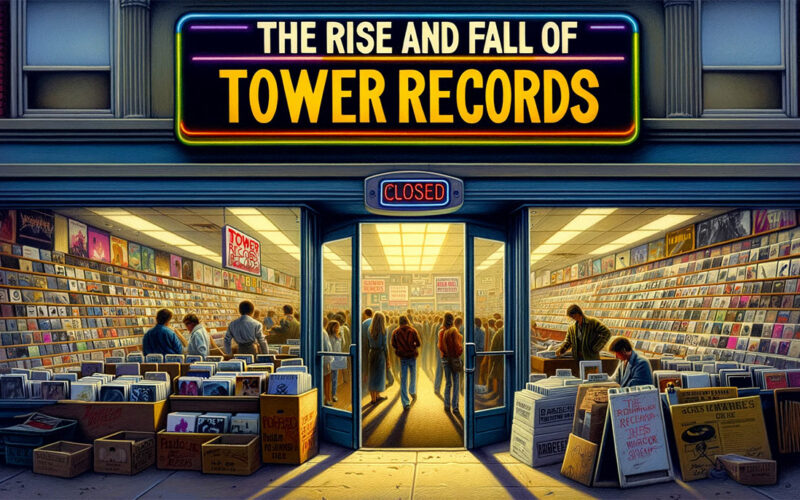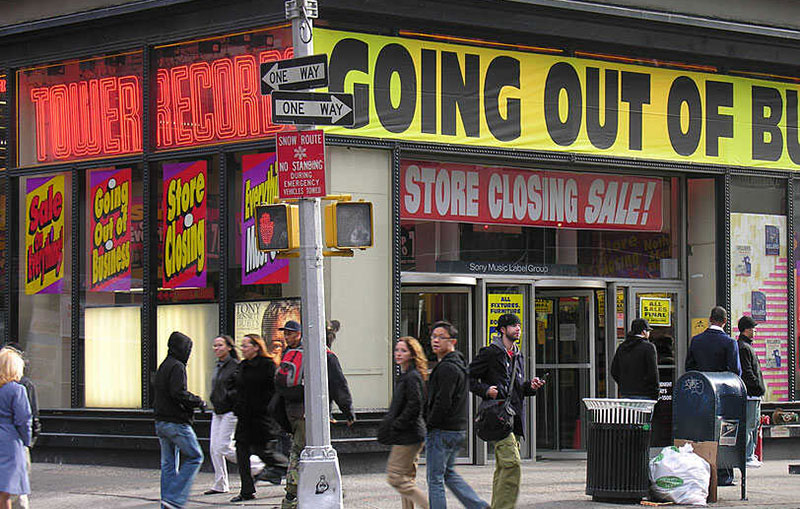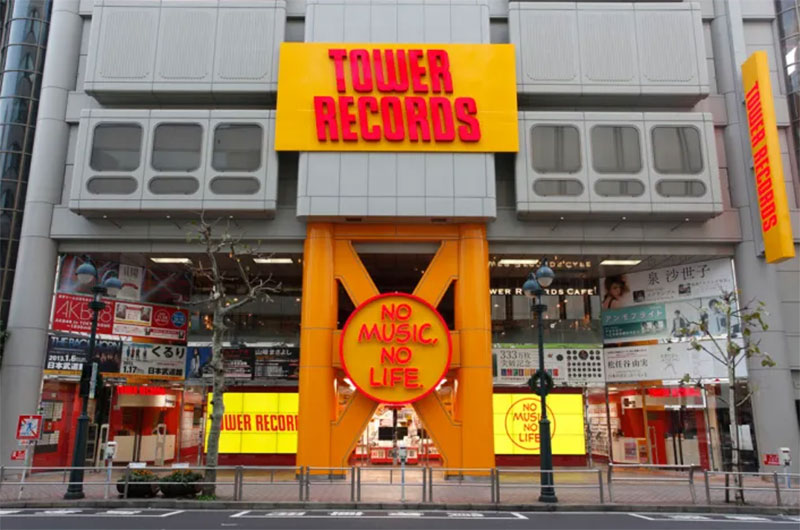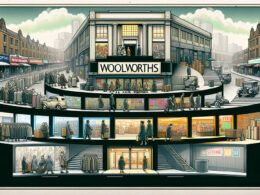Music’s Silenced Echo: What Happened to Tower Records?

Picture this: a time when music wasn’t just a click away. You actually had to get up, go out, and dive into rows upon rows of music albums to find your jam. That’s what Tower Records was all about. It was more than just a store; it was like the heart of the city, pumping out beats and rhythms 24/7.
Every town’s got its pulse, right? Well, for anyone who dug music, Tower Records was the pulse. It wasn’t just about buying a record; it was an experience.
You’d bump into other folks, argue over bands, and discover tunes you never knew you’d love. It was that electric feel, you know? And everyone wants to know what happened to Tower Records when that vibe just… faded.
Each store was a landmark, no kidding. Bright yellow bags and those red signs were like beacons for music lovers.
And those listening stations? Revolutionary. You could sample the tracks before buying—that was the real deal. Every visit felt like an event, something to look forward to all week.
The Founding and Expansion of Tower Records
The Early Days
It all started with Russ Solomon, a name that became legendary in the music retail industry. A visionary, one might say, who took a simple idea and spun it into a melody that reached far and wide.
Russ Solomon’s beginnings in Sacramento
From a humble corner in his dad’s drugstore, Russ built an empire. Picture the guy, flipping through vinyl, learning what makes folks tick.
He had a knack for it—finding that perfect record for whoever walked in. That’s how the story began, in Sacramento, and it’s a classic—almost like the tracks that Tower Records used to sell.
Expansion from a small record mart to a significant player
It wasn’t overnight, but Russ’s baby grew up fast. Tower Records shot up from a local haunt to a place that had the world talking. It set the stage for what a record store could be—a real player in the music scene.
Strategic Growth
The growth wasn’t just about getting bigger; it was about being in the spots that mattered. Like planting a flag and saying, “We’re here, and we’re all about the music.”
Opening of iconic locations in San Francisco and Los Angeles
San Francisco, LA—these weren’t just cities. They were the cradle of culture, the places where music was happening.
And right there, Tower Records put down roots, becoming a part of the city’s DNA.
International expansion, with a focus on Japan
Then came Japan. If you’re gonna go big, go huge, right? The Land of the Rising Sun was all about innovation, and Tower Records became synonymous with music there.
They weren’t just selling records; they were selling a slice of Americana, a taste of something cool and coveted.
Tower Records at its Zenith
Financial Milestones
So, there was this time when Tower Records wasn’t just a store; it was like a king sitting on a throne of vinyl and CDs.
The cash registers were singing tunes of their own, with money flowing in like an endless track.
Peak revenue and Forbes listing of Russ Solomon
Imagine, just imagine, the dude who started it all, Russ Solomon, right there on the Forbes list.
The man, his empire of tunes, standing shoulder to shoulder with giants. Peak revenue times were like a hit single that stayed on the charts forever. That’s the level Tower Records was playing at.
Cultural Impact
And it wasn’t all about the money, no sir. The real deal was how Tower Records started to shape the very soul of music culture.
Influence on music culture and industry tastemakers
Every record that spun in those stores? It was like they had the power to make or break sounds. Industry tastemakers lurked in those aisles, scouting what’s hot, what’s not.
Tower Records was the temple where music worshippers came to pay homage. And let me tell you, when those big shots in the industry looked for what’s next, they looked at Tower Records.
Tower Records as a temple for music worshippers
For real, walking into Tower was like entering a sanctuary. You’re there, flicking through the music, and every album you touch is like a prayer for the ears.
It was a spiritual thing for those who got their kicks on the turntable and speakers.
The Digital Revolution and Missed Opportunities
Early Foray into Online Sales
Alright, here’s where the beat starts to skip. The world’s going digital, and Tower Records? They dipped their toes in the virtual waters.
Launch of the first online music store on AOL
Once upon a time, before the world knew streaming like we do now, Tower Records launched the first online music store on AOL.
Yeah, you heard that right. They were pioneers, leading the charge into this new dawn.
Establishment of tower.com
And then, boom, tower.com comes online. They got their own corner of the internet, a digital shopfront that was ready to ride the wave.
Underestimation of Digital Music
But here’s the plot twist: that wave was a tsunami called digital music, and Tower Records, well, they didn’t quite catch it right.
Lack of serious investment in a digital-first music world
It’s like they saw the digital-first music world as a fad, something that wouldn’t stick. There wasn’t enough betting on this horse, not enough chips on the table.
Competition from big-box outlets and digital platforms
And as Tower Records is putting pennies into the digital jar, out come the big guns. Big-box outlets and digital platforms started to play a different tune, one that Tower Records didn’t quite groove to.
Financial Struggles and Downfall

Debt and Overexpansion
Let’s break it down, flip the record, and talk about the B-side of the Tower Records story, the part with the scratches and skips.
Aggressive international expansion financed by debt
Imagine you’re at a party, and you’ve got this grand idea to throw even bigger bashes worldwide.
But, you’re borrowing cash to make it happen, stacking up IOUs like old school records. That’s what Tower Records did.
They went big, real big, across the globe, but the wallet was riding on borrowed time. And man, that debt was a beat they couldn’t dance to forever.
The impact of borrowing and the inability to service debt
Here’s the downer: when you borrow, you gotta pay back, with interest. It’s like cranking up the volume but not having enough dough to keep the electricity running.
The party’s over when the lights go out. And for Tower Records, the lights started dimming.
Market Changes and Competition

Now, the world wasn’t just watching Tower Records; it was changing the channel.
The competition was flipping the script, and the market was tuning out.
Price-fixing settlement and its repercussions
So there’s this big stink over price-fixing, right? The music biz got caught with their hands in the cookie jar, and Tower Records was part of that mess.
They had to cough up cash in a settlement, and that’s like trying to fill the Grand Canyon with a spoon – just not happening.
The rise of digital music platforms and Internet piracy
Then comes the digital tsunami. Music platforms popping up online, and people downloading tunes like there’s no tomorrow. Internet piracy’s the new DJ, and he’s playing a set that Tower Records can’t match.
Bankruptcy and Liquidation
Alright, so this is the part where things get really gnarly.
Details of the bankruptcy filings
Tower Records hits a wall, and that wall’s got ‘Bankruptcy’ spray-painted all over it.
They had to file the papers, admit that the party funds are drained, and it’s time to call it a night.
Liquidation process and closure of U.S. stores
Liquidation is like the ultimate garage sale, but with neon ‘Everything Must Go!’ signs.
It’s a heartbreaker, for sure. The Tower Records stores, once hallowed halls of rock and roll, got the final curtain call.
Legacy and Aftermath
Russ Solomon’s Later Ventures
The man, the myth, the legend, Russ Solomon, wasn’t done. Not by a long shot.
Attempts to create a new record store post-Tower Records
He’s like that rockstar that keeps coming back for one more encore. There was talk, moves, and grooves to get back in the game, to spin that vinyl once more with a new gig.
Tower Records’ Lasting Impact
Tower Records wasn’t just a store, it was a vibe, a scene, a chapter in the history books of music.
Reflections on the lasting cultural impact
The impact? Huge. Tower Records was like that one track you never skip. It’s the soundtrack to countless memories, a tune that still echoes.
Continued presence of Tower Records in Japan

And dig this, in Japan, the Tower Records beat goes on. They’re keeping the record spinning, proving that sometimes the B-sides are just as sweet.
FAQ On What Happened To Tower Records
Why did Tower Records close down?
You know, it’s like Tower Records missed the memo that the music scene was going digital. They were riding high on CD sales, but when the digital wave hit with online stores and music streaming, they couldn’t catch up.
They also had a ton of debt from trying to paint the globe with their stores. Tack on some stiff competition from the big box retailers and downloadable tunes, and it’s clear what happened to Tower Records was a classic case of not keeping up with the fast-paced music biz.
What led to the downfall of Tower Records?
It’s a mixtape of reasons, really. Tower Records was all about expansion but funded it with heavy borrowing. They had a rockstar attitude but didn’t plan for the hangover when sales dipped, and the debt collectors came knocking.
They were also slinging CDs in an MP3 world. Didn’t pivot to digital quickly enough, and boom—customers moved on to the next big hit.
Did internet piracy affect Tower Records?
Oh, absolutely. Internet piracy hit like a wrecking ball, with people downloading music without paying a dime. Tower Records was in the line of fire, with sales plummeting as more folks figured, ‘Why buy when you can click?’
That, on top of streaming services offering all-you-can-eat tunes for the price of a CD or two, and you’ve got a recipe for a retail ghost town.
Are there any Tower Records stores left?
You might catch the ghost of Tower Records if you’re in Japan, ’cause they’ve kept the vibe alive over there. They managed to sidestep the chaos that took down the US stores and are doing their own thing. But stateside? All that’s left are the stories and the echo of the last record spinning.
How did digital music platforms contribute to Tower Records’ problems?
Picture this: digital music platforms are like that new DJ with the flashy setup, and Tower Records was still spinning vinyl. People could now get music cheaper, faster, and more conveniently, and Tower just couldn’t turn the tables fast enough to keep the party going.
Digital was the new cool, and unfortunately, Tower just wasn’t on that guest list anymore.
What was Tower Records’ peak like?
Back in the day, Tower Records was like the main stage at the biggest music festival. They had it all—every record you could dream of. It was more than a store; it was a cultural hotspot where music lived and breathed.
When they hit their peak, it was like they were leading the global music parade from every corner of the map.
How did Tower Records change the music retail industry?
Tower Records wasn’t just selling music; they were selling an experience. They revolutionized the music retail scene by making their stores hangout spots where music lovers could discover and talk tunes for hours. They set the bar for what a music store could be—part clubhouse, part library, all rock and roll.
What were the major mistakes Tower Records made?
First off, they underestimated the digital tsunami—didn’t ride the wave of online sales and streaming. Then, they kind of partied too hard with the expansion without a sober plan for the aftermath.
Too much debt, too little agility. It’s like they were jiving to yesterday’s hits and didn’t hear the future’s rhythm knocking.
How has Tower Records’ legacy lived on after its closure?
The spirit of Tower Records is like that legendary concert everyone still talks about. The brand might have left the building, but the culture it built, the influence on music discovery, and the nostalgia for flipping through stacks of records—that’s all still jamming in the collective memory.
Plus, documentaries and tales from music buffs keep the legend spinning.
What can businesses learn from what happened to Tower Records?
Alright, so Tower Records was like a rock star that didn’t tune into the new soundwaves of business—namely e-commerce and digital music. The key takeaway? Adapt or become a classic oldie.
Stay alert to the shifts in how people consume your product. Innovation isn’t just a buzzword; it’s your lifeline in the retail concert of the century.
Conclusion
Ever spun a record backwards, trying to catch a secret message? Well, let’s flip the tale of Tower Records and see what whispers we can catch.
Imagine you’re DJing a killer set, but then someone trips over the cord. Music stops. Awkward silence. That’s kind of what went down when digital music rolled up. Tower Records had the chance to switch to a new track, to adapt to the streaming groove, online sales, digital downloads – the works. But, they clung to their vinyls a tad too long. The message? When the beat changes, you gotta drop a new track, or the party moves on without you. That’s exactly what happened to Tower Records; the party moved on.
Now, let’s chat about that warm, fuzzy feeling of walking into a record store, flipping through albums, and gabbing with someone who’s just as stoked about that obscure B-side as you are. That’s community, and it’s got this timeless cool to it. Even in a world that’s all thumbs and screens, nothing beats the good old in-person ‘Hey, you heard this one?’. Tower Records was a maestro at that. They knew the magic of dropping the needle on a record and watching someone’s face light up. That magic? It’s a keeper.
So, where does that leave us? Thinking about what happened to Tower Records, we’ve got to groove with the times but never forget the power of a real, live, flip-through-the-bins kind of place. Because sometimes, it’s not just about the music—it’s about the people, the place, the moment. And that’s the kind of song that never really ends, even if the store’s lights go out.
If you liked this article about what happened to Tower Records, you should check out this article about what happened to THQ.
There are also similar articles discussing what happened to Compaq, what happened to Sbarro, what happened to Nortel Networks, and what happened to Sharper Image.
And let’s not forget about articles on what happened to Polaroid, what happened to Netscape, what happened to Quibi, and what happened to Digg.
- Top 7 Ways Outsourcing eCommerce Customer Service Can Increase Your Sales - May 5, 2024
- Animate with Ease: Top CSS Animation Libraries Today - May 5, 2024
- Golang’s Growing Use: What is Golang Used For? - May 5, 2024








